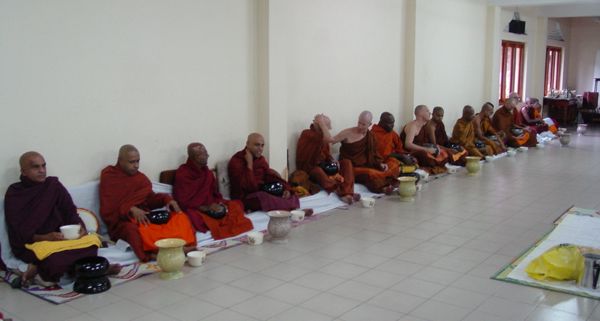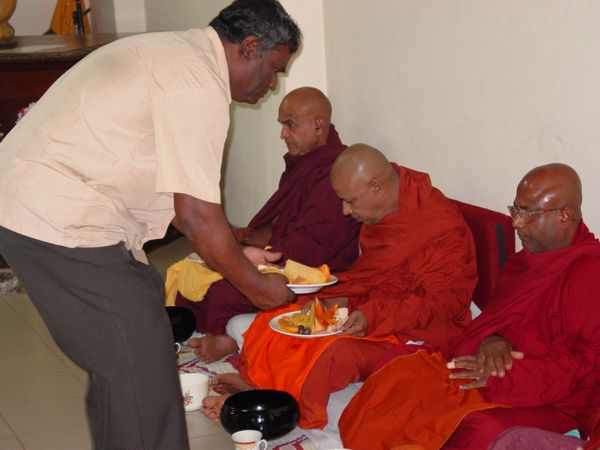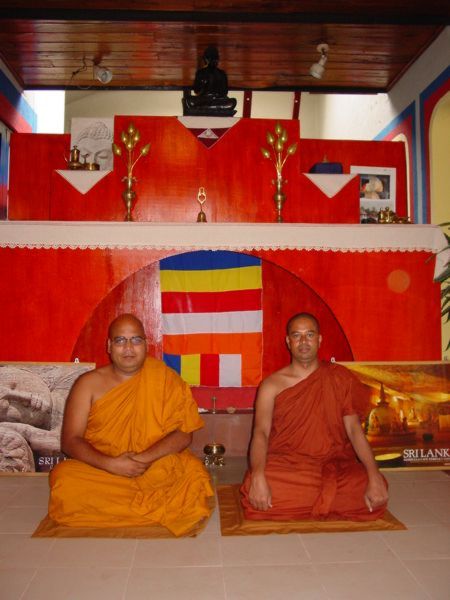

That clears that up! December 16,2005
To discourage mosquitos we have been burning mosquito coils, but they are messy. Our good neighbor, our landlady’s sister, suggested that we try a little electric device that holds a small tablet which heats and sends out a smokeless mosquito deterrent. We got one, called “Good Knight Heater.”
Our Good Knight Heater came with a “Warranty Certificate” that reads:
“This warranty protects your heater from manufacturing defects for 365 nights from the date of purchase. Faulty machines should be returned to your dealer.
N.B. The pilot lamp does not affect the action of the heating plate. Consequently, the pilot lamp is not covered under the warranty.”
Well, that clears that up!
The date of the BPS Founders’ Day Memorial dana was changed from just before the election to December 10th (Human Rights Day! Don’t we recall some great demonstrations in Japan and celebrations too, when Daw Suu won the Nobel Peace Prize, which is always announced on that day?! Congratulations to Mohamed Elbaradei whose name should be a household word! Kudos for his ringing call“Make nuclear weapons a taboo, like slavery”!)
This was our first dana at the BPS, and we didn’t really know what to expect. We ourselves couldn’t do a curry (Evidently, people volunteer to bring different curries, and we weren’t part of the system.), so we decided to take something different for the monks. Since there were going to be a number of western monks there, we decided to give some special cheese and crackers, which could either be “appetizers” or get offered with the fruit. We got a fine big gouda cheese with pepper, which was labeled, in case there was any doubt, “Pure Vegetarian”! Yeah!
Ken cut up a big ripe pineapple, Thai style, so that the inedible core and eyes were taken out. We’ve noticed that the way of serving pineapple here is pretty rough–just peel it, cut it into slices, and eyes be damned. We were also surprised to see that the fruit offered to the monks included entire 8-inch slices of papaya, which couldn’t have been easy to eat by hand. Different countries, different ways.
Our last contribution was dessert. We got a jaggery cake that looked very moist and tasty. For good measure, we added two bars of Tablerone and a large Lindt 70% Cocoa bar. We had heard that Ven. Nynaponika, the great German monk who founded the BPS and who was being remembered on this day, had dearly loved his chocolate, so we thought of him when we made our offering.
We’d been misinformed that there would be ten monks attending, when, in fact, there were sixteen. It was still a great joy in getting soap, toothpaste, toothbrushes (Our dentist always recommends soft for everybody, so we searched for soft!), and paracetamol (the Asian name for Tylenol, good for headaches, but not upsetting to the stomach). Add to that our Buddhist Relief Mission pens, marking our fifteenth official anniversary as an NGO with our website <www.brelief.org> printed on the barrel.
The place was upstairs at the BPS in the big hall at the back, which we’d not seen before. It is a really wonderful space, with a great Buddha image in a corner and a row of cushions covered in white cloth along one wall for the monks. Evidently, they hold meditation on Thursday afternoons which we might just want to join.
While waiting for everything to start, we had a chance to talk with Dennis, a retired civil servant from London who has settled in Sri Lanka and divides his time between meditation centers. In one place he is close to Kandy and does three months worth of proofreading at a stretch, while he spends the next three months in a remote center without amenities, but marvelously quiet. He remarked that there was a remarkable phenomenon taking place in Sri Lanka–a growing interest in meditation among Sri Lankan young people. Heartening news indeed!
 |
 |
|
As the monks came in and took their seats, we noticed a young western woman sitting with the employees and friends of BPS on the floor, so with Dennis, there were four of us foreign lay people and five western monks, German, Australian, Dutch, American, and Swiss. Later, we had a chance to talk with Sonia and learned that she was Italian and had come as an election observer. She’d also monitored voting in Cambodia and had an interest in Buddhism. After the election in Kandy, she opted to stay on and spend some time in a retreat center. She had been like a child in a candy shop downstairs at BPS and had bought a lot of books. We gave her our address and phone number and invited her to stay with us when she returned to Sri Lanka, which she is planing to do.
Although it’s the easiest thing imaginable to find a tuk-tuk when you need one in the town, it’s also a great convenience to be able to call one for a whole series of errands, round trip. Most drivers, even those who are only renting their three-wheelers (we’ve been told they pay 250 rupees for a day, plus petrol), have cell phones. We’ve collected a whole bank of numbers, and decide who to call, considering where they live and their religion (we don’t like to call a Muslim on Friday, of course,) and their English ability (Several are really helpful if we’re looking for something but have no idea where it’s available).
We were surprised that many of the tuk-tuk drivers who hang around Riverdale Junction, just in front of Riverdale Hotel, which is a couple of minutes from our house, are Tamils. We asked one of them, and he informed us that about 90% of them are indeed Tamil. We wondered why. It was not long until we learned that Anniewatte(also spelled, Aniwatte, Anniwatte, and Anniwaththa) used to be a big tea and rubber plantation. When it was sold off by the European woman who owned it, the Indian Tamils brought during the British era as “estate workers” had no place to go and no way to survive. A local evangelical church took up their cause, gave them assistance, and their children are now all tuk-tuk drivers (and, apparently, Christians) in this area.
There is universal agreement among drivers that the Sri Lankan police are rotten, greedy, and terribly corrupt. That holds true across religions and ethnic differences. There is also the general perception that the police discriminate against Tamils.
Sad but true, but this country had an opportunity to be fair, open, and inclusive in the fifties, but a few elite chauvinists had an agenda, and the country went to “Sinhala only,” thereby cutting rural Sinhalese off from a good education in the international language of English, and excluding and discriminating against a large minority, the Tamils. Appealing to language, culture and religion may have gotten these elite politicians influence and votes then, but it also sowed the seeds of the civil war that followed, flared up for real in 1983, continued until a tentative ceasefire was reached four years ago, and is seriously threatening to start up again at any moment. (Some people would say it has already begun again in earnest. We can only hope they are wrong.)
We’ve become active in Servas again after a hiatus of six years, while we were in the States taking care of Mother, and then getting ourselves out. Our first Servas experience was as hosts in Sojiji, then as travelers in 1978-79, then again as hosts in Japan. Looking back, we realize how much we learned from Servas travelers and hosts. Many of those friendships are still strong! We look forward to sharing our comfortable house with travelers when they come.
The local coordinator is also the National Secretary, and he kindly stopped by to deliver the application and have a cup of tea. He’s a social worker, involved with youth projects, especially for the children of “mixed marriages,” which here means Sinhalese and Tamil. The kids he’s targeting are mainly working in the markets as fruit sellers and hawkers. He wants them to have English language skills, because that is a passport to better work. He takes the children to a forested area that his program owns where they can scout, play in the fresh air, and practice a variety of language activities. We hope to visit his programs some Saturday when we’re free.
When the electricity and water go off for the day, what’s to do? Obviously, go shopping! A truck with a loudspeaker atop the cab went around the neighborhood last week, telling us that water and electricity would be cut off until five o’clock. The water’s no problem for us, since we have a tank which holds more than enough to tide us over, but no electricity means no work on the computer. So we decided the time was right to get some things we’ve really been needing. With our shipment delayed (or lost forever?!) we have been suffering with the computers. Both the writing desk we bought and the dining table are too high. Sitting on the straight backed, at the dining table has been very hard on our shoulders and our wrists. Sitting on a chair in the living room, with feet up on another, was hard on the derriere because the seat is only a foam cushion on thin slats. We decided to get computer stands and office chairs. While we were out, we thought, “What the heck!” We also bought very comfortable dining room chairs and, just for the hell of it, a living room with real upholstered seats, which we could also enjoy. We congratulated ourselves that we had restrained from buying a new dining table. After all, we always keep a cloth on the table, so it doesn’t really matter whether the top is veneer or highly polished hard wood, does it?
After all the shopping, we agreed that we needed to have some decent cups to be able to offer visitors some proper tea. Savithri had lent us two glass cups and saucers, but serving good Sri Lankan tea to guests in a bank mug (a gift for opening an account) and water glasses was not nice. Ken had read about a local ceramics company that had just won a prize for excellence. Their business has been thriving, they are exporting to Europe and North America, and they are always seeking to incorporate new designs. We inquired at the shop where we had bought the tiffin carrier in January. Yes, they carried Dankotuwa products, and he showed us some really beautiful plates. When we told him that we wanted a cups, with or without a tea pot, he showed us some junk from China. “Don’t you have Dankotuwa tea cups?” we asked. “No,” he replied slowly. “Well,” he continued, “ we have these coffee cups.” He showed us some nice, but small cups in a pattern we didn’t really like. “What about this pattern?” we persisted, showing him a plate with an autumnal colored ring of flowers and gold trim. “No,” he repeated. We don’t have cups in that pattern . . not, unless you buy this whole boxed set.” From a display case, he pulled a plain cardboard box and opened it. There was a complete set–six cups, six saucers, six small plates, one dinner plate, a tea pot a sugar bowl, and a cream pitcher–in exactly the pattern we wanted. We were so excited, we were ready to take it without seeing every piece, but he wanted to unpack it to make sure nothing was broken. It’s amazing how much better the tea tastes from these lovely cups, poured from this elegant, locally made, teapot!
 |
|
| One of Lily's meals and our new dishes | |
When we moved into Woodlawn Park Drive, almost our first task was building an altar for our Buddha images. Expecting our Buddhas to arrive momentarily, we felt that we had better build an altar here, too. We asked Savithri, and she asked her brother-in-law, who promptly found us a carpenter who, he promised, would do whatever we wanted. Well, the problem was letting him know what we wanted. We showed him the drawing and the place where the altar would go, but it was obvious that he could not really picture what it was. Taking the drawings which showed how many inches (feet) of 2 x 2 strips were needed we headed to a lumber yard. We showed the sketches to the manager, who counted the pieces, added them up, and told us how many feet we needed. Then, with the diagrams Ken had made of how most efficiently to cut the surfaces from plywood, we headed to a hardware store. We picked out the plywood, the varnish, the nails, and the brushes. Ken urged the carpenter to pick out EVERYTHING he needed, but since he didn’t really know what he was going to do, except follow directions, he didn’t really know what he needed.
We returned to the house with all the lumber. (It was too much, of course, for a tuk-tuk, so we had to pay extra for a van. No problem.) We began by looking at the diagrams of the frame. Ken explained, as best he could, how to go about building the skeleton. He was eager to jump right in and put the whole thing together, but Ken insisted that he proceed systematically, cutting the 2X2s into pieces to exactly the right lengths. He did that. Ken then showed him which pieces would go together into rectangles for top and bottom which would be joined by the upright pieces. Ken had figured all the lengths exactly, figuring the exact size of the altar, then subtracting 2 inches for each piece and 1/2 inch or each piece of plywood. After he had put together some of the pieces, we discovered that some of the 2X2's had been planed and some had not. Those that had been planed were no longer 2X2, nor were they even square. They were an eighth to a quarter inch off. The carpenter had cut matching sections from different pieces, so the frame would not be even. He was surprised that that mattered, so he really didn’t know what to do. Well, off he went to buy more 2X2's, because, of course, the pieces he needed were the longest, and everything had already been cut up.
The whole process took about a week longer than we expected, not so much because of the rain, but because he had to run into town about four more times to get better varnish, more wood preservative, new screws, or replacement plywood when he glued the veneer onto the wrong side, ruining the beautiful finish on two pieces. Most of the time, he would finish one little task, and then come and ask what to do next, afraid to continue, lest he make a mistake. By the time we were putting on the finishing touches, he understood what we were doing, and he was proud that he had been able to do it. It is a beautiful altar, and it fits perfectly in the place where it is now sitting. It was a challenge to finish, but with no language in common, we did it. The experience reminds us of a Lao folktale we have used with our classes.
We Are All Human Beings, Aren’t We?
On a very hot day, the Lao king and his advisors were being rowed down the Mekong River. Finally the king ordered the boatmen to tie up the boats for the night. As he lay down to rest, he heard a boatman complaining, “ Why do those @#$%! royal advisors get to loll around in comfort while we sweat and strain at the oars hour after hour? We are all human beings, aren’t we?” The king pretended to be sleeping. A little later, the king heard a noise and asked the disgruntled boatman to find out what was causing it. The man went off and returned a little while later to tell the king that the noise was being made by some puppies at the nearby temple. “How many puppies are there?” asked the king. The boatman didn’t know so he had to go back to count them. “There are four puppies, Sire,” he reported. “What color are they?” asked the king. The boatman hadn’t noticed, so he again had to go back to find out. When he returned he told the king that they were black and white. The king then called his royal advisor and asked him the same question about the noise. When the advisor returned, he said to the king, “Your majesty, the noise is coming from the nearby temple. The monk there has four black and white puppies. There are two male and two female, which were born a week ago.” The king confronted the boatman, saying“You complained that it wasn’t fair that you had to do all the hard work while my trusted advisors could ride in comfort. Yes, we are all human beings, but you had to make three trips to the temple to find out what my advisor learned in just one trip. That’s why some are boatmen, and some are advisors.”
And that’s much the same reason that our carpenter is a carpenter ...
 |
|
| Ven. Pannasila, Ven. Buddha Prakash, the finished altar | |